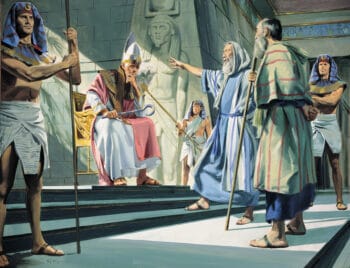Daily Lesson for Thursday 17th of July 2025
Read Exodus 6:28-30; Exodus 7:1-7. How does the Lord deal with Moses’ objection?
God presents Himself to Moses as Yahweh, which means that He is the personal and close God, the God of His people, and the God who entered a covenantal relationship with them.
This immanent God again commands Moses to go and speak with Pharaoh. With a lack of self-confidence, Moses again objects: “Why would Pharaoh listen to me?” Here again we can see not just Moses’ humility but, again, his desire to get out of the task, which so far has not gone too well.
“When God ordered Moses to go back to Pharaoh, Moses showed self-distrust. The term ‘aral sepatayim—literally ‘uncircumcised lips,’ which is used here to express Moses’ lack of speaking ability (6:12, 30)—is similar to that found in Exodus 4:10: ‘slow of speech.’ ”—Andrews Bible Commentary: Old Testament, “Exodus” (Berrien Springs, MI: Andrews University Press, 2020), p. 205.
God in His mercy gives Aaron to help Moses. Moses will speak to Aaron, who will then speak publicly to Pharaoh; thus, Moses will play the role of God before the Egyptian king, and Aaron will be his prophet.
This account provides an excellent definition for the role of a prophet. A prophet is a spokesperson for God; he or she is His mouthpiece to transmit and to interpret God’s word to the people. As Moses spoke to Aaron, and then Aaron announced it to Pharaoh, so God communicates with a prophet, who then proclaims God’s teaching to the people. This can happen verbally, in person; or, as was most commonly done, the prophet received the message from God and then wrote it down.
God also explains to Moses what he can expect from the encounters with Pharaoh. He warns him that the confrontation will be tense and long. For the second time God stresses to Moses that Pharaoh will be very stubborn and that He will harden his heart (Exodus 4:21, Exodus 7:3). The result, however, will end in something good, for “ ‘the Egyptians will know that I am the Lord’ ” (Exodus 7:5, NIV). That is, even amid the chaos that follows, God will be glorified.
|
Moses ran out of excuses for not following what God had called him to do. What excuses might we use to try to get out of what we know God wants us to do? |
 (0)
(0)



